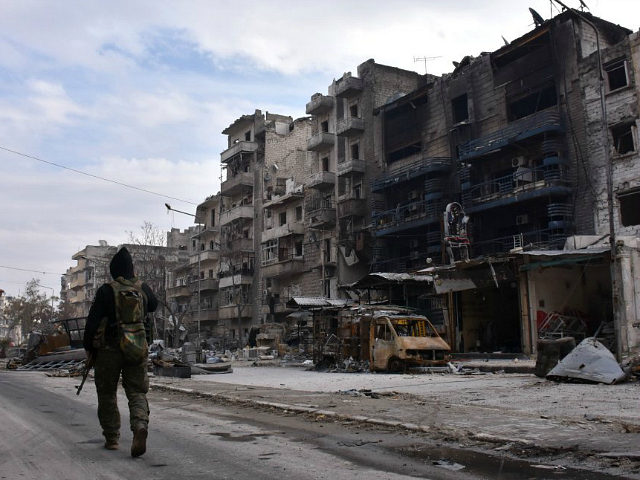Syrian Prime Minister Imad Khamis offered a rosy outlook for his national economy on Tuesday that seems difficult to square with the reality of a nation devastated by six years of civil war.
Granted, getting rid of the Islamic State is an improvement and Khamis is clearly a glass-half-full kind of guy. Syria’s SANA news agency reports on a press conference in which Khamis declared the economy to be in “good condition,” pointing to a plump government budget for next year as evidence.
“Premier Khamis stated the establishment of industrial areas and the new investment projects, despite the terrorist war waged on Syria, set a clear evidence on the strength of the state, adding that this year witnessed the launching of projects worth over SYP 186 billion, of which SYP 100 billion allocated for projects supervised by the Military Construction Establishment and Ministry of Public Works and Housing,” SANA writes.
Khamis further “expressed optimism over executing developmental projects as scheduled, taking into account the speed of project implementation which the governmental delegation found during its recent visit to the provinces of Hama, Lattakia and Tartous.”
A sizable reconstruction budget was also announced for Aleppo, formerly one of Syria’s major industrial cities, which suffered enormous damage during a long siege.
The Prime Minister’s press conference touted short-term reconstruction plans by every ministry; urgent efforts to bring factories, schools, water pumps, and power plants back online; and President Bashar Assad’s “administrative reforms.” A great deal of Syria’s population was hoping for administrative reforms that would involve removing Bashar Assad from office, but as that no longer appears to be in the cards, the dictatorship is moving to shore up its standing with an uneasy population and show the world community it is prepared to make important changes.
At the beginning of October, Reuters took a sober look at the situation in Aleppo by comparing the fates of two textile makers, one of whom remained in the city while the other fled to Jordan. The one who moved to Jordan has immediate plans to come back – “What do I benefit if I want to set up a factory and there is no safety?” he asked – but Reuters nonetheless found signs of “growing confidence,” such as the return of an annual trade fair to Damascus.
“But the war still dominates Syria’s economy, even where the fighting has stopped. Most Aleppo factories were destroyed, badly damaged or looted,” the report added. “Their workers fled as refugees or became combatants. Despite a new power line to the city, there is little electricity, leaving people reliant on expensive diesel generators. Water must be pumped electrically.”
There is still fighting in the region, corrupt military and militia are extorting bribes at roadway checkpoints, and sanctions against Syria are still in force, so some of the businessmen who relocated from Aleppo were not eager to return. Even some of Assad’s supporters criticized the government for not doing enough to win them back. They also pointed out that skilled workers were displaced from the conflict zones, in some cases outside Syria’s borders, and they don’t feel safe enough to return.
Syrian ministers have recently expressed hope that their patron states of Russia and Iran will pitch in to help with rebuilding the company and restoring its economy. In fact, Syrian Foreign Minister Walid Muallem said, it “depends on Russian companies how soon we will fully restore Syria’s economy” at a recent meeting of the Russian-Syrian trade and technical commission.
Iran has also been looking to expand its sphere of economic influence in Syria, prominently including major contracts to repair Syria’s damaged electrical grid. Until that project is complete, Iran has announced plans to export electric power directly into adjacent provinces of Syria.
A number of lucrative contracts in Syria have been steered to companies owned by Iran’s Islamic Revolutionary Guard Corps, in what might be seen as an effort to compensate the IRGC for helping Assad survive the Syrian civil war. The compensation includes more than just money; for example, one major contract to the IRGC involves building a cell phone network in Syria that could serve as a useful intelligence asset for the Revolutionary Guards.

COMMENTS
Please let us know if you're having issues with commenting.